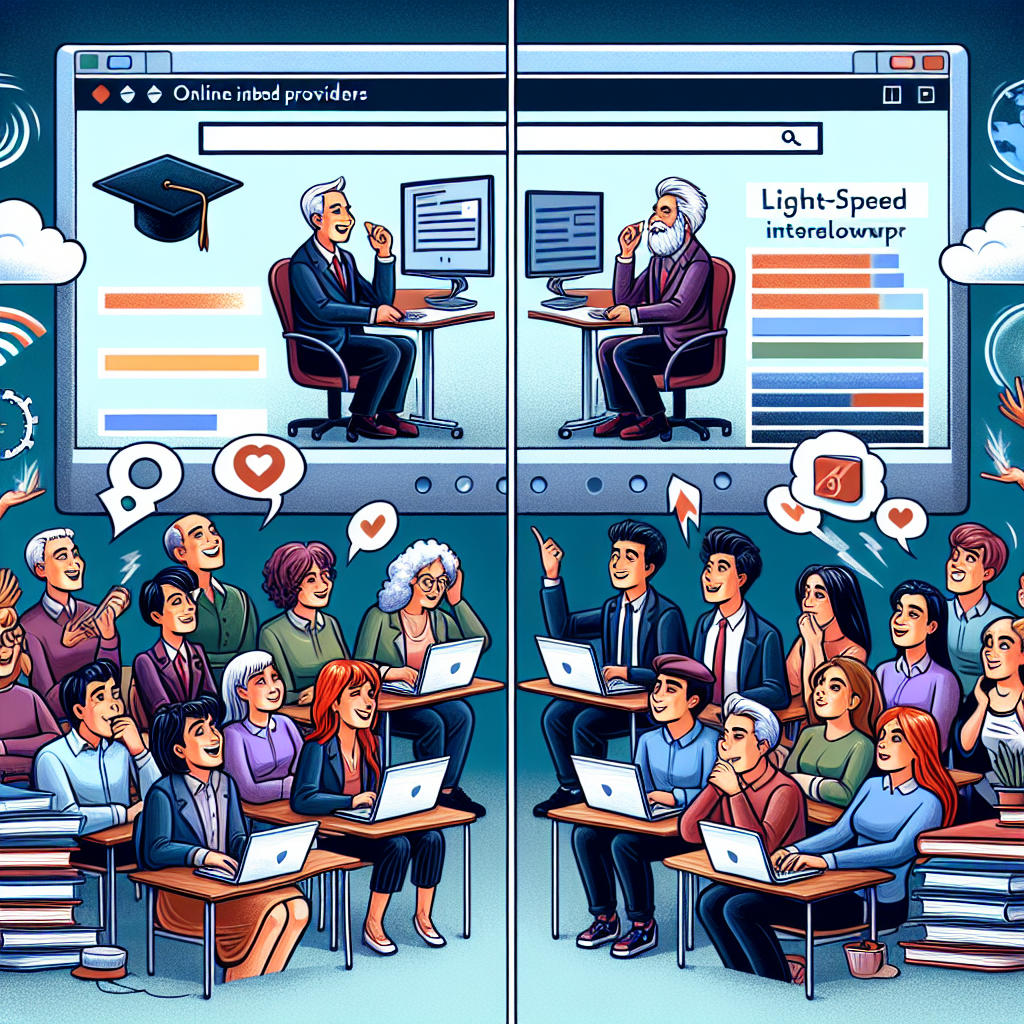In today’s tech-savvy world, the need for high-speed internet providers has become crucial, especially for those engaged in online schooling. The success of virtual learning greatly depends on a reliable and fast internet connection, allowing students to attend virtual classes, access online resources, and submit assignments without interruptions. In this article, we will delve into the realm of high-speed internet providers, exploring the best options available to optimize your online schooling performance. From fiber-optic to cable internet, we will guide you through the top providers that offer fast and stable connections, ensuring a seamless virtual learning experience. Let’s dive in and discover the key to unlocking your full potential in the digital classroom!
Understanding the Importance of High Speed Internet for Online Schooling
In the realm of online education, high speed internet is a critical component that directly influences the quality of the learning experience for both students and educators. To grasp the significance of high speed internet for online schooling, it is imperative to delve into the following aspects:
- Definition of high speed internet for educational purposes:
High speed internet for educational purposes refers to a robust and fast internet connection that allows for seamless access to online learning platforms, virtual classrooms, video conferences, and other educational resources without interruptions or delays. It involves a network connection with rapid data transfer speeds, low latency, and high bandwidth to support various online activities essential for effective teaching and learning.
- Impact of internet speed on online schooling experience:
The speed of the internet connection directly impacts the online schooling experience in several ways. Slow internet speeds can lead to buffering during live lectures, delays in submitting assignments, distorted audio and video quality during virtual classes, and overall frustration for both students and instructors. On the other hand, high speed internet ensures smooth communication, real-time interactions, quick access to learning materials, and a more engaging online learning environment.
- Why reliable and fast internet is crucial for students and educators:
Reliable and fast internet is crucial for students and educators to facilitate uninterrupted learning and teaching processes. For students, a high speed internet connection enables them to participate actively in online classes, collaborate with peers, access educational resources promptly, submit assignments on time, and engage in multimedia-rich learning activities. Similarly, educators rely on fast internet to deliver lectures smoothly, conduct virtual discussions, provide timely feedback to students, and access online teaching tools seamlessly. Overall, a dependable high speed internet connection is essential for optimizing the online schooling performance of both students and educators.
Factors to Consider When Choosing a High Speed Internet Provider

Speed and Bandwidth
- Importance of High Download and Upload Speeds for Online Learning
High-speed internet is crucial for optimal online schooling performance. Faster download speeds ensure that educational materials such as videos, documents, and interactive tools can be accessed without delays. Similarly, high upload speeds are essential for submitting assignments, participating in virtual discussions, and taking exams online. A reliable internet connection with fast speeds can prevent interruptions and buffering, allowing students to engage seamlessly in their virtual classrooms.
- Bandwidth Requirements for Streaming Lectures, Video Calls, and Accessing Educational Resources
Online schooling involves various activities that demand significant bandwidth. Streaming live lectures, participating in video calls with teachers and classmates, and accessing online educational resources all require a stable internet connection with ample bandwidth. Inadequate bandwidth can lead to poor video quality, audio delays, and disruptions in the learning process. Therefore, selecting a high-speed internet provider that offers sufficient bandwidth is essential for a productive online learning experience.
- How Internet Speed Impacts the Ability to Submit Assignments and Take Exams Online
The speed of the internet connection directly influences the efficiency of submitting assignments and taking exams in an online environment. Slow upload speeds can result in delays in uploading completed assignments, leading to missed deadlines and academic penalties. Additionally, during online exams, a fast internet connection is crucial to ensure seamless communication with the exam platform, timely submission of answers, and the prevention of disconnections that may compromise the integrity of the assessment process. Therefore, choosing a high-speed internet provider with reliable upload speeds is paramount for the successful completion of online assignments and exams in virtual learning settings.
Reliability and Stability
- Significance of a stable internet connection for uninterrupted virtual classes
In the realm of online schooling, a stable internet connection is paramount for students to engage effectively in virtual classes. The reliability of the internet provider directly impacts a student’s ability to attend live sessions, participate in discussions, submit assignments, and access learning materials. A reliable connection ensures seamless communication with teachers and classmates, preventing disruptions that can hinder academic progress.
- Redundancy measures offered by top internet providers to ensure consistent connectivity
Leading high-speed internet providers implement robust redundancy measures to maintain stable connections for their users. These measures may include backup systems, multiple data centers, and failover protocols to minimize downtime and ensure continuous access to online educational resources. By investing in redundancy infrastructure, providers demonstrate their commitment to delivering reliable connectivity for optimal online schooling performance.
- How downtime can affect a student’s ability to participate in live sessions and complete coursework
Downtime, or periods when internet service is unavailable, can significantly impact a student’s online schooling experience. During downtime, students may miss important lectures, be unable to submit assignments on time, or lose access to study materials essential for their coursework. This disruption not only hampers academic progress but also creates frustration and stress for students trying to navigate virtual learning environments. Therefore, choosing a high-speed internet provider known for its reliability and minimal downtime is crucial for ensuring uninterrupted online schooling performance.
Affordability and Availability
Factors to Consider When Choosing a High Speed Internet Provider
In the realm of online schooling, affordability and availability are crucial considerations when selecting a high speed internet provider to support optimal academic performance. The following points delve into the intricacies of these factors:
- Examining the cost-effectiveness of high speed internet plans for students and families
In the pursuit of seamless online learning experiences, it is imperative to assess the cost-effectiveness of various high speed internet plans offered by providers. Students and families must scrutinize the pricing structures, considering not only the monthly fees but also any additional charges or hidden costs. By comparing the features and prices of different plans, individuals can identify the most suitable option that aligns with their budgetary constraints without compromising on quality.
- Availability of internet service providers in different regions for remote learners
The geographical aspect plays a significant role in determining the availability of high speed internet providers for remote learners. While urban areas may have a plethora of options from various providers, rural or underserved regions might face limitations in terms of accessible internet services. It is essential for online students to research and verify the coverage of different providers in their specific location to ensure they can access reliable connectivity for their educational endeavors.
- Comparing pricing options and promotional deals to find the best value for online schooling needs
To optimize online schooling performance, individuals should engage in a comprehensive comparison of pricing options and promotional deals offered by different high speed internet providers. Providers often introduce special discounts, bundles, or incentives to attract new customers, and students can leverage these offerings to secure cost-effective solutions for their internet requirements. By carefully evaluating the value proposition of each provider and weighing the benefits against the costs, students can make informed decisions that enhance their online learning experiences.

Top High Speed Internet Providers for Online Schooling
Provider A
-
Overview of services, speeds, and packages tailored for educational users
Provider A stands out in the market for its high-speed internet services specifically designed to meet the needs of online schooling. With lightning-fast connection speeds ranging from 100 Mbps to 1 Gbps, students and educators can enjoy seamless online learning experiences without disruptions or lags. Additionally, Provider A offers a variety of packages that cater to different budget constraints, ensuring that there is an option suitable for every educational user. -
Customer reviews and satisfaction ratings related to online learning performance
According to numerous customer reviews, Provider A has consistently received high satisfaction ratings from users engaged in online schooling. Students and educators praise the reliability and consistency of the internet connection, emphasizing the positive impact it has on their virtual learning experiences. The low latency and minimal downtime provided by Provider A contribute significantly to an optimal online schooling performance, making it a top choice among educational users. -
Special features or discounts offered to students and educators
In addition to its exceptional services and speeds, Provider A offers special features and discounts specifically tailored to students and educators. These may include exclusive access to educational resources, priority customer support for academic inquiries, and discounted rates for internet plans. By recognizing the unique needs of online learners, Provider A goes the extra mile to enhance the online schooling performance of its users and create a supportive environment for educational success.
Provider B
Top High Speed Internet Providers for Online Schooling
- Analysis of network infrastructure and technology used to deliver high speed internet
Provider B utilizes a combination of fiber-optic and cable technologies to ensure high-speed internet connectivity for optimal online schooling performance. Their network infrastructure is designed to deliver reliable and consistent speeds to support various online learning activities such as video conferencing, streaming lectures, and accessing educational resources without interruptions.
- Comparison of pricing plans and data caps for online schooling purposes
When it comes to pricing plans, Provider B offers competitive packages tailored specifically for online schooling needs. They provide flexible options with affordable rates to accommodate students and educators requiring high-speed internet for virtual classes and academic research. Moreover, Provider B does not impose stringent data caps, allowing users to fully engage in online learning activities without worrying about exceeding limitations.
- Any educational tools or resources provided along with the internet service
In addition to high-speed internet connectivity, Provider B offers a range of educational tools and resources to enhance the online schooling experience. These may include access to educational websites, virtual libraries, and collaboration platforms that facilitate seamless interaction between students and teachers. By integrating these resources with their internet service, Provider B aims to support academic success and foster a conducive online learning environment for all users.
Provider C
- Unique Selling Points for Online Education
- Provider C offers dedicated educational packages designed specifically for online schooling, ensuring seamless connectivity and minimal disruptions during virtual classes.
- Their advanced parental control features allow for a secure online learning environment, giving parents peace of mind regarding their children’s internet usage.
-
Provider C’s 24/7 customer support tailored to educational needs ensures quick resolution of any connectivity issues that may arise during crucial study hours.
-
Speed Test Results and Performance Metrics
- Speed tests conducted on Provider C’s network consistently show high download and upload speeds, meeting and often exceeding the requirements for smooth online schooling activities such as video conferencing and accessing learning platforms.
-
Performance metrics reveal minimal latency and jitter, crucial for real-time interaction in virtual classrooms without lags or delays, enhancing the overall online learning experience.
-
Testimonials from Online Students
- Online students using Provider C have reported a significant improvement in their online schooling performance due to the reliable and fast internet connection provided.
- Testimonials highlight the seamless streaming of educational videos, quick access to online resources, and uninterrupted participation in virtual lectures, all contributing to a more productive and engaging online learning environment.
Tips for Optimizing High Speed Internet Connection for Online Learning
In the realm of online schooling, having a reliable high-speed internet connection is paramount to ensure smooth virtual learning experiences. Here are some practical tips to optimize your internet connection for optimal online schooling performance:
- Utilizing Wi-Fi Extenders or Boosters:
-
Wi-Fi extenders or boosters can be instrumental in enhancing the coverage and strength of your Wi-Fi signal throughout your home. By strategically placing these devices in areas with weaker signal reception, you can ensure a more stable and robust connection for your online classes.
-
Managing Bandwidth Usage:
-
During peak hours when multiple devices are competing for bandwidth, it’s crucial to manage your internet usage efficiently. Consider prioritizing your online schooling activities by limiting the use of bandwidth-heavy applications or downloads during critical learning times. This can help maintain consistent speeds and minimize disruptions during virtual classes.
-
Updating Router Firmware and Equipment:

- Outdated router firmware and equipment may hinder your internet connection’s ability to support faster speeds. Regularly check for firmware updates provided by your internet service provider or router manufacturer to ensure optimal performance. Additionally, if your current equipment is outdated, consider upgrading to newer models that are better equipped to handle high-speed internet connections effectively.
Addressing Common Challenges with High Speed Internet for Online Schooling
In the realm of online schooling, high-speed internet is the backbone of a successful academic experience. However, various challenges can hinder the optimal performance of online schooling due to internet-related issues. Addressing these common challenges is crucial for ensuring seamless virtual learning opportunities for students.
Dealing with connectivity issues during virtual exams or important lectures
When facing connectivity issues during virtual exams or crucial lectures, students may experience interruptions that can disrupt their concentration and overall performance. To mitigate this challenge, it is essential to:
- Investigate the Root Cause: Identify whether the connectivity issue is related to the internet service provider, the Wi-Fi network setup, or the device being used for online schooling.
- Implement Network Enhancements: Consider upgrading to a higher internet speed plan, optimizing the Wi-Fi network coverage with extenders or mesh systems, or using an Ethernet connection for more stable connectivity.
- Communicate with Instructors: Inform instructors about any connectivity issues beforehand to seek alternative arrangements or accommodations during exams or important lectures.
Troubleshooting slow internet speeds and latency for live video classes
Slow internet speeds and latency can result in buffering during live video classes, leading to a frustrating learning experience for students. To address this challenge effectively, it is important to:
- Run Speed Tests: Conduct regular speed tests to determine the actual internet speed being received compared to the subscribed plan.
- Check for Background Applications: Close unnecessary background applications or downloads that may be consuming bandwidth and causing slowdowns.
- Contact Internet Provider: Reach out to the internet service provider to troubleshoot the slow speeds and latency issues, which could be due to network congestion or technical issues on their end.
Seeking technical support from the internet provider for resolving performance issues
In instances where students encounter persistent performance issues despite individual troubleshooting efforts, seeking technical support from the internet provider becomes imperative. To navigate this challenge effectively, students can:
- Initiate Customer Support Contact: Reach out to the internet service provider’s customer support team via phone, online chat, or email to report performance issues and seek resolution.
- Request On-Site Assistance: If remote troubleshooting proves ineffective, request on-site assistance from the internet provider to diagnose and address the root cause of the performance issues.
- Document Communication: Keep a record of all interactions with the internet provider, including case numbers, troubleshooting steps taken, and proposed solutions for reference and escalation if needed.
FAQs: Exploring the Best High Speed Internet Providers for Optimal Online Schooling Performance
What are the key factors to consider when choosing a high speed internet provider for online schooling?
When choosing a high speed internet provider for online schooling, it is important to consider factors such as speed, reliability, data caps, and customer support. You will want a provider that offers fast and consistent speeds to support video conferencing, downloading and uploading files, and streaming educational content without interruption.
Which high speed internet providers are known for offering reliable service and high performance for online schooling?
Some of the top high speed internet providers known for offering reliable service and high performance for online schooling include AT&T, Xfinity, Verizon Fios, and Spectrum. These providers typically offer fast speeds, reliable connections, and solid customer support to ensure a smooth online learning experience for students.
Are there any affordable high speed internet providers that are suitable for online schooling?
Yes, there are affordable high speed internet providers that are suitable for online schooling. Companies like Optimum, Cox Communications, and CenturyLink offer competitive pricing for their internet services while still providing adequate speeds for online learning activities. It may be worth comparing plans and pricing to find a provider that fits your budget while meeting your online schooling needs.
How can I test the speed and reliability of my current high speed internet provider for online schooling?
To test the speed and reliability of your current high speed internet provider for online schooling, you can use online tools such as Speedtest.net or Fast.com to check your internet speed. You can also monitor your connection for any interruptions or slow speeds during peak usage times to assess the reliability of your provider. If you are experiencing consistent issues with speed or connectivity, it may be worth exploring other high speed internet providers in your area.


